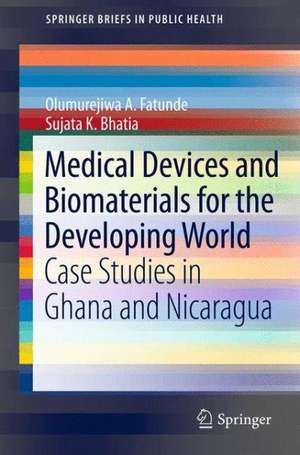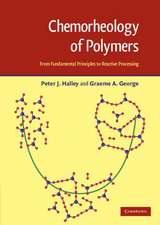Medical Devices and Biomaterials for the Developing World: Case Studies in Ghana and Nicaragua: SpringerBriefs in Public Health
Autor Olumurejiwa A. Fatunde, Sujata K. Bhatiaen Limba Engleză Paperback – 31 aug 2012
This book explores the difficulties that accompany successful transfer of technologies between disparate settings. The book then leaves the world of traditional technology and focuses on biomaterials, which represent an enormous opportunity for developing societies to become active participants in the development of new technologies. Biomaterials can be used in the treatment of disease throughout the developing world and beyond. Biomaterials encompass a range of naturally derived substances; of particular interest here are naturally derived and synthetically manufactured materials with potential applications in different body systems. Because many of these materials can be grown, the agricultural output of developing nations is an obvious potential source of these biomaterials. The book considers the cases of Ghana and Nicaragua as examples of the broader situation in West Africa and Central/South America. These two regions are uniquely positioned with regard to both health care and technological capabilities, and both stand to grow significantly in the coming years. While the agricultural sectors of the two nations are quite different, both are major producers of corn and other materials that should be investigated further. Of course, the difficulty in using a foodstuff for medical purposes is fully explored.
Din seria SpringerBriefs in Public Health
- 5%
 Preț: 393.92 lei
Preț: 393.92 lei -
 Preț: 259.96 lei
Preț: 259.96 lei - 5%
 Preț: 337.71 lei
Preț: 337.71 lei - 5%
 Preț: 121.97 lei
Preț: 121.97 lei - 5%
 Preț: 164.59 lei
Preț: 164.59 lei - 5%
 Preț: 363.07 lei
Preț: 363.07 lei - 5%
 Preț: 356.32 lei
Preț: 356.32 lei - 5%
 Preț: 451.10 lei
Preț: 451.10 lei - 5%
 Preț: 360.34 lei
Preț: 360.34 lei - 5%
 Preț: 390.96 lei
Preț: 390.96 lei - 5%
 Preț: 388.02 lei
Preț: 388.02 lei - 5%
 Preț: 359.05 lei
Preț: 359.05 lei - 5%
 Preț: 359.05 lei
Preț: 359.05 lei - 5%
 Preț: 356.67 lei
Preț: 356.67 lei - 5%
 Preț: 388.02 lei
Preț: 388.02 lei - 5%
 Preț: 357.77 lei
Preț: 357.77 lei - 5%
 Preț: 419.76 lei
Preț: 419.76 lei - 5%
 Preț: 356.67 lei
Preț: 356.67 lei - 5%
 Preț: 420.68 lei
Preț: 420.68 lei - 5%
 Preț: 359.78 lei
Preț: 359.78 lei - 5%
 Preț: 389.88 lei
Preț: 389.88 lei -
 Preț: 481.58 lei
Preț: 481.58 lei - 5%
 Preț: 397.96 lei
Preț: 397.96 lei - 5%
 Preț: 423.95 lei
Preț: 423.95 lei - 5%
 Preț: 325.86 lei
Preț: 325.86 lei - 5%
 Preț: 452.39 lei
Preț: 452.39 lei - 5%
 Preț: 356.11 lei
Preț: 356.11 lei - 5%
 Preț: 357.41 lei
Preț: 357.41 lei - 5%
 Preț: 360.86 lei
Preț: 360.86 lei -
 Preț: 378.12 lei
Preț: 378.12 lei - 5%
 Preț: 391.16 lei
Preț: 391.16 lei - 5%
 Preț: 356.46 lei
Preț: 356.46 lei - 5%
 Preț: 387.29 lei
Preț: 387.29 lei - 5%
 Preț: 426.69 lei
Preț: 426.69 lei - 5%
 Preț: 360.51 lei
Preț: 360.51 lei - 5%
 Preț: 356.67 lei
Preț: 356.67 lei - 5%
 Preț: 360.34 lei
Preț: 360.34 lei - 5%
 Preț: 358.48 lei
Preț: 358.48 lei - 5%
 Preț: 485.32 lei
Preț: 485.32 lei -
 Preț: 377.35 lei
Preț: 377.35 lei - 5%
 Preț: 327.25 lei
Preț: 327.25 lei -
 Preț: 474.84 lei
Preț: 474.84 lei - 5%
 Preț: 425.04 lei
Preț: 425.04 lei - 5%
 Preț: 388.37 lei
Preț: 388.37 lei - 5%
 Preț: 361.06 lei
Preț: 361.06 lei - 5%
 Preț: 247.73 lei
Preț: 247.73 lei - 5%
 Preț: 355.38 lei
Preț: 355.38 lei -
 Preț: 443.58 lei
Preț: 443.58 lei - 5%
 Preț: 358.84 lei
Preț: 358.84 lei
Preț: 379.09 lei
Nou
Puncte Express: 569
Preț estimativ în valută:
72.55€ • 78.78$ • 60.94£
72.55€ • 78.78$ • 60.94£
Carte tipărită la comandă
Livrare economică 22 aprilie-06 mai
Preluare comenzi: 021 569.72.76
Specificații
ISBN-13: 9781461447580
ISBN-10: 1461447585
Pagini: 80
Ilustrații: XVIII, 112 p. 41 illus., 11 illus. in color.
Dimensiuni: 155 x 235 x 12 mm
Greutate: 0.2 kg
Ediția:2012
Editura: Springer
Colecția Springer
Seria SpringerBriefs in Public Health
Locul publicării:New York, NY, United States
ISBN-10: 1461447585
Pagini: 80
Ilustrații: XVIII, 112 p. 41 illus., 11 illus. in color.
Dimensiuni: 155 x 235 x 12 mm
Greutate: 0.2 kg
Ediția:2012
Editura: Springer
Colecția Springer
Seria SpringerBriefs in Public Health
Locul publicării:New York, NY, United States
Public țintă
ResearchCuprins
Introduction.- Case study of Ghana.- Case study of Nicaragua.- Corn and soy-derived materials: Properties and potential clinical applications.- Feasibility study of corn- and soy-derived materials.- Discussion, recommendations, and conclusion.
Notă biografică
Prof. Sujata Bhatia is Assistant Director for Undergraduate Studies in Biomedical Engineering at Harvard University.
Olumurejiwa Fatunde is a graduate student in International Health Policy at the London School of Economics. She graduated from Harvard University with an AB in biomedical engineering.
Olumurejiwa Fatunde is a graduate student in International Health Policy at the London School of Economics. She graduated from Harvard University with an AB in biomedical engineering.
Textul de pe ultima copertă
Medical Devices and Biomaterials for the Developing World focuses on the adoption of medical technology in the developing world, specifically focusing on the the role that new biomaterials can play. It explores the difficulties that accompany the successful transfer of technologies between disparate settings, focusing on the cases of Ghana and Nicaragua as examples of the broader situations in West Africa and Central and South America. These two regions are uniquely positioned with regard to health care and technological capabilities, and both stand to grow significantly in the coming years.
Biomaterials represent an enormous opportunity for developing societies to become active participants in the development of new technologies, and can be used in the treatment of diseases throughout the developing world and beyond. The authors of this book argue that advanced technology should be aligned with the needs of developing and emerging markets, and that an alternative definition of technology should be embraced: one that considers natural sources for materials and tools for treatment, and that is not restricted to traditional computerized and electronic technologies.
Biomaterials represent an enormous opportunity for developing societies to become active participants in the development of new technologies, and can be used in the treatment of diseases throughout the developing world and beyond. The authors of this book argue that advanced technology should be aligned with the needs of developing and emerging markets, and that an alternative definition of technology should be embraced: one that considers natural sources for materials and tools for treatment, and that is not restricted to traditional computerized and electronic technologies.
Caracteristici
First book to bridge biomaterials science and public health Discusses the distinct advantages of naturally-derived materials for the developing world Includes supplementary material: sn.pub/extras Includes supplementary material: sn.pub/extras










